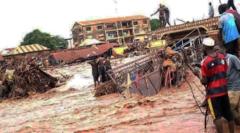In an unprecedented disaster, recent floodwaters in central Nigeria have resulted in the death of at least 110 individuals, as reported by local officials. Torrential downpours lasted for hours, leading to a catastrophic situation that left significant destruction in its wake.
Flood Devastation: Over 110 Lives Lost in Central Nigeria's Rain Crisis

Flood Devastation: Over 110 Lives Lost in Central Nigeria's Rain Crisis
Tragic floods sweep through central Nigeria after relentless rainfall, claiming numerous lives and displacing communities.
In Mokwa, Niger State, the Director of the Niger State Emergency Management Agency (Nsema), Abullahi Baba-Arah, detailed that surging floodwaters inundated over 50 homes along with their inhabitants. The Nigerian government's heartfelt condolences have been publicly expressed, with Minister of Information and National Orientation, Mohammed Idris, announcing that security and emergency agencies have been mobilized to support ongoing rescue efforts.
The hardest-hit areas, identified as Tiffin Maza and Anguwan Hausawa districts, have been described as "devastated" by Mokwa's District Head, Muhammad Shaba Aliyu, who highlighted that such catastrophic flooding has not been seen for six decades. Aliyu has fervently urged government assistance for those impacted.
Rescue operations are still in flux, and many individuals remain vulnerable. One local fisherman, Danjuma Shaba, shared his painful experience after losing his home in the calamity, stating, "I don't have a house to sleep in. My house has already collapsed."
Nigeria's annual rainy season, spanning from April to October, frequently brings flooding, and current forecasts indicate severe downpours in at least 15 states across the country. The destructive impacts of flooding have similarly led to thousands of deaths and widespread displacement last year, illustrating the persistent threat of climate-related disasters in the region.
With efforts underway to assess and aid those affected, the broader implications of flooding on food security and community resilience continue to loom large.
The hardest-hit areas, identified as Tiffin Maza and Anguwan Hausawa districts, have been described as "devastated" by Mokwa's District Head, Muhammad Shaba Aliyu, who highlighted that such catastrophic flooding has not been seen for six decades. Aliyu has fervently urged government assistance for those impacted.
Rescue operations are still in flux, and many individuals remain vulnerable. One local fisherman, Danjuma Shaba, shared his painful experience after losing his home in the calamity, stating, "I don't have a house to sleep in. My house has already collapsed."
Nigeria's annual rainy season, spanning from April to October, frequently brings flooding, and current forecasts indicate severe downpours in at least 15 states across the country. The destructive impacts of flooding have similarly led to thousands of deaths and widespread displacement last year, illustrating the persistent threat of climate-related disasters in the region.
With efforts underway to assess and aid those affected, the broader implications of flooding on food security and community resilience continue to loom large.





















